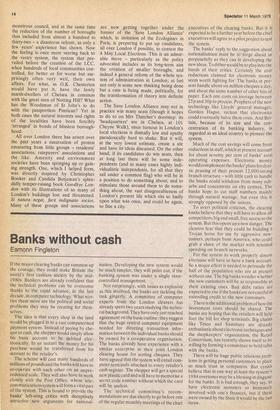Banks without cash
Eamonn Fingleton
If the major clearing banks can summon up the courage, they could make Britain the world's first cashless society by the mid1980s. Bankers are already confident that the technical problems can be overcome thanks to the rapid advance, in the last decade, in computer technology. What worries them more are the political and social problems they may be creating for themselves.
The idea is that every shop in the land would be plugged in to a vast computerised payment system. Instead of paying by cheque or cash, the shopper would simply allow his bank account to be debited electronically. In an instant the money for his purchase would be transferred from his account to the retailer's.
The scheme will cost many hundreds of millions of poundsand the banks will have to co-operate with each other on an unprecedented scale. They will also have to work closely with the Post Office, whose telecommunications system will form a vital part of the system. This is bound to provide the banks' left-wing critics with deceptively attractive new arguments for national
isation. Developing the new system would be much simpler, they will point out, if the banking system was under a single statecontrolled management.
Not surprisingly, with issues as explosive as this involved, the banks are tackling the task gingerly. A committee of computer experts from the London clearers has already spent two years studying the technical background. They have only just reached agreement on the basic outline: they suggest that the huge central computer equipment needed for directing transaction information between the individual banks should be owned by a co-operative organisation. The banks already have experience with a similar enterprise in their joint London clearing house for sorting cheques. They have agreed that the system will entail computer terminals attached to every retailer's cash register. The shopper will get a special new plastic card and will have to memorise a secret code number without which the card will be useless.
The technical committee's recommendations are due shortly to go before one of the regular monthly meetings of the chief executives of the clearing banks. But it is expected to be a further year before the chief executives will agree to a pilot project to test the system.
The banks' reply to the suggestion about nationalisation must be to forge ahead as purposefully as they can in developing the new ideas. Todither would be to play into the hands of their critics. Certainly the cost reductions claimed for electronic money seem worth fighting for. The banks at present handle about six million cheques a day, and about the same number of other bits of paper. Each one costs on average between 25p and 30p to process. Prophets of the new technology like Lloyds' general manager, Gordon Hague, reckon that electronics could eventually halve these costs. And Britain, because of its size and the concentration of its banking industry, is regarded as an ideal country to pioneer the system.
Much of the cost savings will come from reductions in staff, .which at present account for about seventy per cent of banks' total operating expenses. Electronic money would complement the banks' plans fordrastic pruning of their present 12,000-strong branch structure — with little cash to handle the banks could withdraw from many suburbs and concentrate on city centres. The banks hope to cut staff numbers mainly through natural wastage, but even this is strongly opposed by the unions.
To avert political criticism, the clearing banks believe that they will have to allow all competitors, big and small, free access to the system. But this opens up a new danger. The clearers fear that they could be building a Trojan horse for use by aggressive newcomers, perhaps from America, who could grab a share of the market with minimal spending on branch networks. For the system to work properly almost everyone will have to have a bank account. So a major effort is needed to persuade the half of the population who are at present without one. The big banks wonder whether the new customers will be as responsible as their existing ones. Bad debt ratios are expected to rise if the banks are not careful in extending credit to the new customers.
There is the additional problem of how the investment costs should be shared. The banks are hoping that the retailers will help foot the bill for shop terminals. Big chains like Tesco and Sainsbury are already enthusiastic about electronic techniques and the shopkeepers' organisation, the Retail Consortium, has recently shown itself to be willing by forming a committee to hold talks with the banks.
There will be huge public relations problems in getting personal customers to place so much trust in computers. But cynics believe that in one way at least the system's 1984 overtones may be a blessing in disguise for the banks. It is bad enough, they say, to have electronic monsters so intimately involved with one's finances, but if these were owned by the State it would be the last straw.


































 Previous page
Previous page